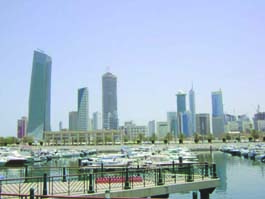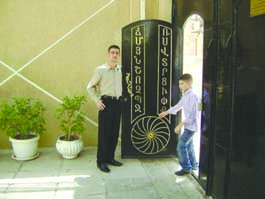Hagop Ohanessian
Staff Writer

Kuwait is a small sovereign Arab emirate bordered by Saudi Arabia to the south, Iraq to the north and west, and the Persian Gulf to the east. Kuwait is one the richest countries in the world, per capita, and is known for its large oil reserves. Kuwait is extremely hot in the summer, reaching high temperatures of 125 to 130 degrees. Kuwait also has the highest currency exchange rates in comparison to the rest of world. For example, one Kuwaiti Dinar is about $3.50. The largest bill is only 20 Dinars, about $90.
The population of Kuwait is three million and there are about three thousand Armenians that live there. The Armenians are well respected by the Kuwaiti government and the community has preserved the Armenian culture through the church, school, and the many cultural organizations. All of the Armenians live in Kuwait City, which is the capital. I have an aunt and uncle in Kuwait and this summer I had the opportunity to travel to Kuwait to see my family as well as to explore the Armenian community. I was in Kuwait for about two months beginning May 28 and returning on July 25.
Armenians and other “foreigners” who live in Kuwait are not allowed citizenship rights. Every Armenian has what we would call a “Green Card” or temporary residence in the country, which must be renewed once a year. Foreigners are also not allowed to own private property so Armenians have to rent their homes and businesses. Only Kuwaitis are allowed ownership of property. Church services are on Friday mornings because that is when the Arabs also attend the mosque. A Friday is like our Sunday here in the United States and that is when most places are closed. In midst of all of these rules and regulations, Armenians have still managed to keep their identity.

Kuwait is interesting because the Armenian community is not very old. Armenians settled in Kuwait in the early 1950s, coming from Syria and Lebanon. Armenians who went to Kuwait in the 1950s primarily went to look for work. The Armenians are skilled workers in different fields such as: body shop, mechanics, and electricians. There are also teachers, doctors, and those involved in business.
My aunt’s family was one of the first Armenian families to travel to Kuwait in 1952. My aunt’s mother, Marie Emrazian and her husband, went to Kuwait in 1952 from Syria to look for a new opportunity in a different country. Mrs. Emrazian explained to me how she was one of the original founders of a Sunday school in Kuwait in 1952. In Syria, Marie Emrazian was a Sunday school teacher as well as a school teacher. During that time there were only eight Armenian families in Kuwait and there was no church or school to support the growing Armenian community. She founded a Sunday school where she invited local Armenian students to attend. These Armenian children were attending Arab schools and did not have the opportunity to learn about Christianity.
In 1962 Mrs. Emrazian said the Armenian population of Kuwait grew and they needed a church and a priest to lead the Armenian community. The Armenian Catholicossate of Antelias sent Fr. Barouyr Sarkisian, who became the first pastor in Kuwait. With a few volunteers and the help of the Catholicos, an Armenian school was opened and a church was also established for the Armenian community. Fr. Sarkisian arrived in February, which in Armenian history is dedicated to St. Vartan, so they named the church St. Vartan. For two years, Mrs. Emrazian volunteered in the Sunday school and taught the students the Armenian alphabet, Armenian history, and the Bible.
As the years passed, with the help of the local government and from Antelias, the Armenian community leaders bought the land to build the Armenian school that today has an attendance of 450 students and goes from K to 12th grade. As the church was established, so were the different organizations. In 1983, Homenetmen an Armenian sports and cultural organization was founded and was involved in doing a lot of fund raising for the Armenian Church and school as well as training young athletes for numerous athletic events.
Unfortunately, the Persian Gulf War of 1991 caused about 1,000 Armenians to leave the country in fear, with many returning to Syria and Lebanon. Others emigrated to the United States and Canada.
Kuwait has had four primates in its history: Archbishop Oshagan, Archbishop Sebouh, Archbishop Yeprem, and currently, Archbishop Goriun Babian. The current pastor is Fr. Ardak who is a native of Syria.
The Armenian community of Kuwait is strong and Armenians take pride in their rich culture. The young Armenians are active in their community and are involved with the church and Homenetmen. Every Armenian child knows how to speak at least three languages: Armenian, Arabic, and English. Kuwait is a growing community and other countries in the Gulf regions such as the United Arab Emirates and Qatar also have developing Armenian communities, but Kuwait by far has the most Armenians in that region.
 Hye Sharzhoom Armenian Action
Hye Sharzhoom Armenian Action